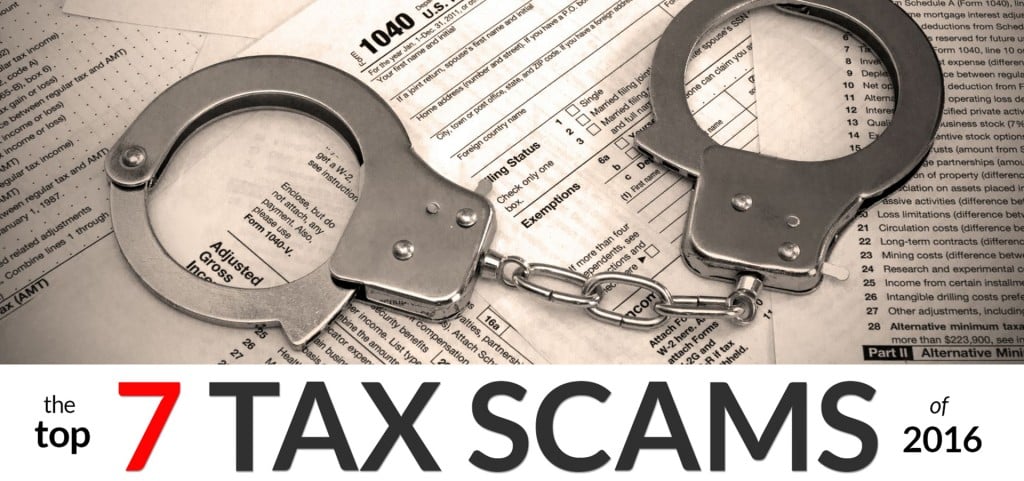Paying taxes is bad enough, but falling prey to a tax scam can be even worse.
Many of the same tax scams crop up year after year, ensnaring new victims all the time.
Being aware of some of the potential pitfalls can make filing taxes easier and keep you out of trouble with the IRS.
Whether you are getting ready to file your taxes or still gathering the required paperwork, you need to be aware of these common tax scams.
Doing your homework ahead of time can protect you from scammers and bogus tax dodges as the April 15 tax deadline approaches.
#1— Identity Theft
The tax filing season is prime time for identity thieves.
After all, your tax return contains a wealth of information identity thieves can use to get credit in your name, take out loans and otherwise make your life miserable.
In the words of Wilfredo Ferrer, the United States Attorney for the Southern Florida (quoted by CBS News):
- For this fraud all you need is a laptop, someone’s social security number, date of birth, not even their name. They can do it from their kitchen table. They can do it at a fast-food chain restaurant. Or they can do it on the beach, as long as they have Wi-Fi access.
Identity thieves can also use personal information they have already gathered to file bogus returns and claim refunds to which they are not entitled.
Such thieves often file early in the hopes that they will receive a refund before the real taxpayer even knows something is amiss.
You can protect yourself from these kinds of scams by:
- filing as early as possible
- checking your credit report regularly for signs of identity theft
- creating strong passwords for tax preparation and financial websites.
#2 — Tax Preparer Fraud
Sometimes the very people you hire to prepare your taxes turn around and violate that trust instead. As IRS commissioner John Koskinen has said (quoted by CNN),
- We see bad actors every year that steal from their clients or compromise returns in ways that can severely harm taxpayers.
Tax preparer fraud takes a number of different forms, from individuals who steal Social Security numbers for their own use to preparers who try to boost client refunds by inventing dependents or claiming bogus credits.
Remember that you are responsible for your return, even if it was prepared by someone else.
You can help protect yourself from untrustworthy preparers by:
- avoiding preparers who claim to get especially high refunds
- avoid preparers who base their fees on how much money they save
- choosing preparers with an established track record
- checking the return carefully before you sign and question any discrepancies
#3 — Questionable Tax Dodges
There is a lot of misinformation out there regarding taxes. For example, you may have heard that:
- paying income taxes is voluntary
- only money backed up by gold is subject to taxation
- students don’t have to file a tax return
- you don’t have to pay taxes if you disagree with the government
Whatever your political beliefs, bogus tax theories could get you into big trouble with the IRS. (And for what it’s worth, here is the crucial amendment to the US Constitution regarding taxation).
Every tax dodge of this kind that has been tested by the IRS has been found lacking.
Think long and hard before you try to avoid paying taxes you owe the IRS.
Failing to do so will undoubtedly cost you more in terms of money, time, legal fees and even jail time, than simply paying what you owe.
#4 — Phone Scams
Phone scams tend to make the rounds as the April 15 deadline gets closer. Taxpayers may receive a phone call from someone claiming to be with the IRS.
The caller may request a variety of personal information, from Social Security numbers and birth dates to the names and birth dates of children. According to Danny Werfel, IRS Acting Commissioner:
- This scam has hit taxpayers in nearly every state in the country. … If someone unexpectedly calls claiming to be from the IRS and threatens police arrest, deportation or license revocation if you don’t pay immediately, that is a sign that it really isn’t the IRS calling.
If you receive such a call, just ask yourself: does it seem likely that the IRS would not already know your Social Security number? Keep in mind that the IRS never:
- demands immediate payment over the phone (a bill always comes first)
- refuses the opportunity to appeal the amount you owe
- insists on a specific kind of payment (such as a cashier’s check or debit card)
- takes credit or debit card numbers over the phone
If you feel that a call is suspect, ask for the caller’s phone number and offer to call them back; most scammers will abruptly hang up.
#5 — Bogus Emails
The IRS does not contact taxpayers via email, but people keep falling for this common scam.
Phishing emails claiming to come from the IRS start appearing in inboxes in early January and continue through the April 15 tax filing deadline. Here is a typical one:
Subject: Notice of Underreported Income
From: no-reply@irs.gov
Taxpayer ID: smith-00000174073547US
Tax Type: INCOME TAX
Issue: Unreported/Underreported Income (Fraud Application)
Please review your tax statement on Internal Revenue Service (IRS) website
(click on the link below):
review tax statement for taxpayer id: smith-00000174073547US
Internal Revenue Service
If you receive such an email, you should:
- never open the email, and especially no attachments associated with it
- flag it as spam
- report it to local authorities and delete it
#6 — Free Money from the IRS
Believe it or not, the IRS is not giving away free money.
These free money scams are attempts to gather Social Security numbers, bank information and other personal data. Thieves often set up shop in poor areas and target low income workers and the elderly.
In the words of a warning from the Federal Trade Commission:
- Other scammers promise you money — a big prize you need to claim. They say the FTC or some other agency [such as the IRS] is supervising the sweepstakes, and that the money will be released as soon as you pay for the shipping, taxes, or some other expense. But it’s all a fake. There is no prize and no money.
The story is different from year to year, but the bottom line is always the same – the IRS has a program that is giving money to eligible taxpayers, and it’s important to sign up today.
If you think you may legitimately be owed money by the IRS, contact the agency directly. Otherwise you can:
- demand more information or ask to call back
- voice your concerns and hang up immediately
- try to get as much information as possible and file a complaint online
#7 — Fake Charities
Giving money to charity is great, and it can even lower your tax bill.
Scam artists know that, and they use the generosity of taxpayers and their desire to pay less in taxes to separate them from their hard-earned money.
When tax season approaches, scam artists may set up fake charities to prey on unsuspecting taxpayers.
The charity might look legitimate, but the contribution will not be eligible for the promised tax deduction.
The IRS is well aware of the problem. Some things to look for when considering donating to charities for tax purposes:
- if it’s too good to be true: for example, you can’t deduct more than you donate
- check carefully from a legitimate list of exempt organizations
- never give or send cash directly; use a check or credit card again
- be especially careful after a major world disaster such as an earthquake
You can protect yourself from this common scam by checking out all charities carefully.
A number of independent agencies keep track of charities, and they can help you sort out the legitimate causes from the scams.
Remember: you have to pay taxes, but you don’t have to fall for scams!








